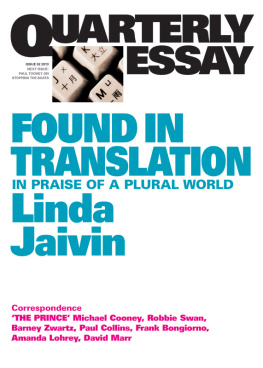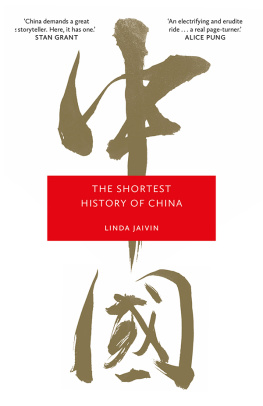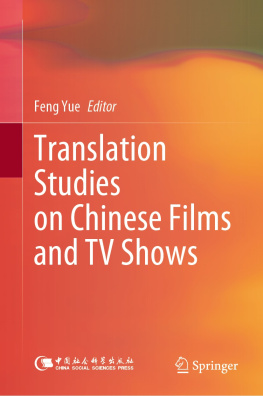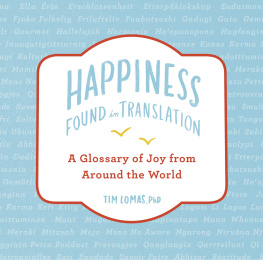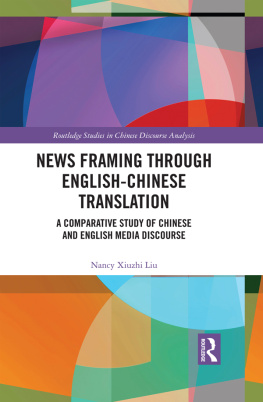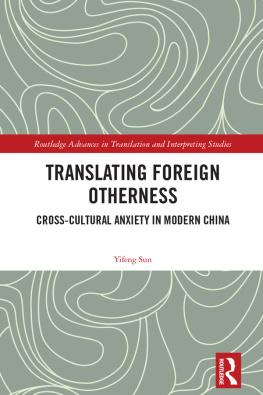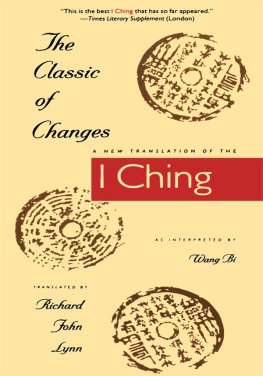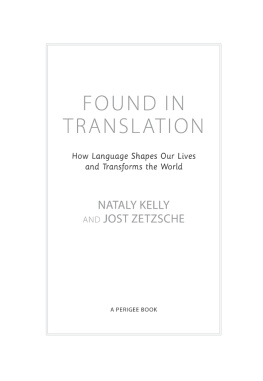FOUND IN TRANSLATION: IN PRAISE OF A PLURAL WORLD
Linda Jaivin
Whats the French for fiddle-de-dee?
Fiddle-de-dees not English, Alice replied gravely.
Who ever said it was? said the Red Queen.
Lewis Carroll, Through the Looking Glass
About six years ago, President George W. Bush was delivering a speech at a G8 summit, when, made impatient by the process of translation, he interrupted his German interpreter: Everybody speaks English, right? Chancellor Angela Merkel responded, Be patient, and signalled the translator to carry on. Those telling this story speak of Bush and Merkel, but the interpreter goes unnamed. Translators are used to labouring in the shadows. And yet diplomatic interpreters, literary translators, film subtitlers and even document drones play a role akin to Ariadne in Greek mythology: while everyones eyes are on Theseus and the Minotaur, translators hold the ball of thread that guides the hero out of the Labyrinth.
If you have ever found yourself in a bookshop tempted by Murakami or the latest Scandinavian thriller but thinking that it is about time you read Proust; if you read Putins op-ed piece on Syria in the New York Times or followed the sensational trial of fallen Chinese politburo member Bo Xilai on SBS; if you have taken a subway in Paris, Moscow or Tokyo; if you saw The Rocket , the award-winning Australian movie set in Laos, or are a fan of film-makers like Almodvar or Wong Kar-Wai; if you have toured Uluru with an Indigenous guide who told stories from the Dreaming; if you have attempted to assemble an eccentrically named wardrobe from Ikea, or installed a Korean washing machine or photocopier; if you have ever asked the waiter in an Italian restaurant to explain a dish on the menu in other words, unless you speak all 7000 languages that exist in the world, or abide in a cave without even a copper-wire connection you live in a world found in translation. Translation lays the tracks over which news, trade, aid, diplomacy, ideas and culture travel. Translation is the invisible skein that binds our world.
It also, from time to time, threatens to unravel it. In 1993, Prime Minister Paul Keating called the Malaysian leader Mahathir Mohamad a recalcitrant for refusing to attend that years APEC summit. Mahathir, whose English is excellent, translated the word into an insult of such severity that he threatened to curtail diplomatic relations and trade with Australia. Yet compared with Keatings usual robust vocabulary of abuse scumbag, brain-dead, boxhead, intellectual rustbucket recalcitrant might have passed for faint praise. In like manner, Prime Minister Tony Abbott discovered the hard way that political rhetoric that whistles up support at home doesnt read so well on the international stage: Stop the boats translates in Indonesia as a potential insult to Indonesian sovereignty, and calling the ALP whacko in a Washington Post interview translates as a gaffe to even right-wing commentators in the US. To the Communist Party of China, engaged in a tense stand-off with Japan over the Diaoyu/Senkaku Islands, Abbotts statement, Japan is our best friend in Asia, translates in China to, Australia has a lot of explaining to do.
The sixteenth-century Italian diplomat Gasparo Contarini always insisted on speaking through an interpreter so that if misunderstandings arose, the blame could be shifted to the translation. But sometimes the translator needs thanking: when a Hungarian leader receiving a ceremonial welcome in Sierra Leone was referred to as the president of Bulgaria, it was the interpreter who, without missing a beat, corrected the error.
The English word translation derives from the Latin trans , meaning across, plus latum , the past participle of to bear or carry. It describes transferring something from one place or realm (real or metaphorical) to another, and is not confined to language. Catholics speak of translating the relics of saints when they move them from one shrine to the next. Social campaigners advocate translating concern into action. Novels are translated into films and films into theatre shows. The Chooky Dancers of Elcho Island translated Zorba the Greek into dance and dance into humour. Japanese and Chinese animators translated the classic Chinese novel Journey to the West (also known as Monkey ) into cartoons; computer programmers translated it into multi-platform games; and alternative-rocker Damon Albarn translated it into opera. Theatre from Brazil to Spain to the US to South Korea would not be what it is today without translations of Brecht; nor would Scorsese be Scorsese without the French Nouvelle Vague , or Tarantino Tarantino without John Woo. One of my first jobs, sub-editing primary-school English textbooks at the Oxford University Press in Hong Kong in 1980, involved translating text such as this is a pig to this is a pin so that the books could be sold in the predominantly Muslim Indonesian and Malaysian markets.
The broad conception of translation that exists in English doesnt itself translate into all other languages. In many other languages, you might not call most or any of the examples above translations at all. To describe the process of translating from one language to another in Hindi, you use the word anuvad , which means to tell again. The Chinese word is fanyi : fan , turning around, reversing or rummaging, plus yi , which closely correlates to what we mean in English by either translate or interpret (translate orally). In ancient China, there were different words for translators according to where they worked and the languages from which they translated: ji in the east, xiang in the south, Didi in the west and yi (as in fanyi ) in the north.
The Japanese have a particularly expressive vocabulary for literary translation. Some words carry judgments of quality, ranging from the humble setsuyaku, [my] clumsy translation, to meiyaku , celebrated translation, and even chyaku , a translation that is better than the original (and the registered trademark of a Japanese publisher). Others are descriptive: shyaku is the translation of an excerpt from a longer work, taiyaku is a translation in which the original text appears on the facing page, jyaku is a translation of a translation and tenyaku is a translation into Braille.
*
If translation can claim a founding myth, it would have to be the Biblical story of the Tower of Babel. When the Great Flood receded and Noahs ark came to rest on Mount Ararat, the story goes, all the human survivors spoke the same tongue. They lived well and harmoniously until Noahs grandson Nimrod became a property developer. Nimrod constructed a city with a soaring tower that, when finished, would reach heaven itself but failed to secure council permission first. Yahweh was not keen on sharing the view. To stop the tower, He sabotaged the builders communications, dividing their speech into mutually unintelligible languages. The builders threw in the trowel, and the tribes scattered over the earth. Over the centuries, through translation, they began to weave themselves back together again: no longer a city of Babel, but a yammering, yabbering global village in which everyone talks at the same time and occasionally manages to communicate.
One strand in the web of translation that binds the globe originates in ancient Greece and Rome. In the time of the Roman orator Cicero (10643 BCE), to be educated was to know Greek as well as Latin. Like many other ambitious young men of his time, Cicero visited Greece and learned the language well. Back home, he translated Greek philosophy, mythology and poetry into Latin. His translations and other writings influenced the development of Roman culture and thus early Western civilisation generally, and resonated powerfully with the Europeans of the Renaissance and the Enlightenment.

